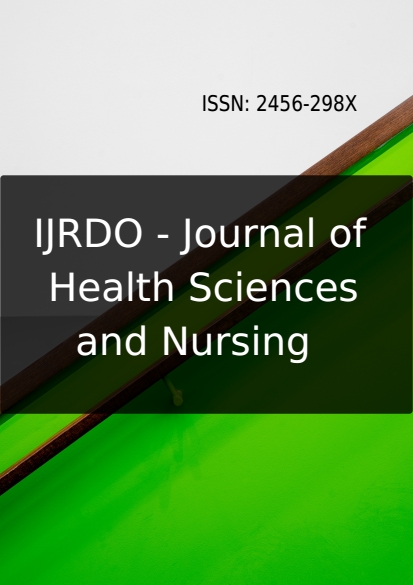Knowledge of Nurses regarding Nutritional management of Diabetes mellitus Patients in Tertiary Care Hospitals, Peshawar.
Abstract
Objective: To explore knowledge of nurses regarding nutritional management of diabetes mellitus patients in Tertiary Care Hospitals, Peshawar.
Methods: A Cross sectional study was conducted among nurses. A self-made questionnaire of 20 questions regarding the basic knowledge about nutritional management of diabetes mellitus patients was distributed among 150 nurses selected by convenient sampling technique. Data were entered and analyzed by using SPSS version 22. In descriptive statistics frequencies and percentages were calculated for categorical variable and means and SD were calculated for continues variables. Chi-square was applied to determine any significant association between variables.
Results: Results showed that that (54%) had poor knowledge about diabetic diet indicated by total knowledge of less than 60%, 21.3% of the nurses had average knowledge, while 13.33 % had good and only 13 % of the studied participants had excellent knowledge regarding diabetic dietary management which was above 80% score according to arbitrary scale on questionnaire. The study revealed that professional qualification, professional experience and gender of the participants has no significant association with knowledge level While significant value was found in LRH with knowledge level and professional qualification with a P value of 0.019.
Conclusion: Based on the results of the current study, it is found that majority of the nurses have poor knowledge regarding diabetic diet especially nurses in LRH have comparatively lowest knowledge. It directly affects the quality of care provided to the diabetic patients. It also raises concern about standard care.
Downloads
References
Shaw JE, Sicree RA, ZimmetPZ. Global estimates of the prevalence of diabetes for 2010 and 2030. Diabetes Res & Clin Prac. 2010; 87(1):4–14.
Frank B. Globalization of Diabetes, the role of diet, lifestyle, and genes. Diabetes Care. 2011; 34(6):1249-s57.
Ozougwu JC, Obimba KC, Belonwu CD, Unakalamba CB. The pathogenesis and pathophysiology of type 1 and type II diabetes mellitus. J of Physio & Pathophysio. 2013; 4(4):46-57.
Shaikh S, Shaw JE, Sicree RA, Zimmet PZ. Global estimates of the prevalence of diabetes for 2010 and 2030. Diabetes Res & Clin Pract. 2010; 87(1):4–14.
Yalcin NN, Cihan A, Gundogdu H, Ocakci A. Nutrition Knowledge Level of Nurses. Health Sci J. 2013; 07(1):99- 108.
Nathan DM, Buse JB, Davidson MB, Ferrannini E, Holman RR, Sherwin R, Zinman B. Medical management of hyperglycemia in type 2 diabetes: a consensus algorithm for the initiation and adjustment of therapy: a consensus statement of the American Diabetes Association and the European Association for the Study of Diabetes. Diabetes Care. 2009; 32(1):193-203.
International Diabetes Federation (IDF) Diabetes Atlas (Internet). 6th edition.www.diabetesatlas.org 2013.
Ahmed A, Jabbar A, Zuberi L, Muhammad IM, Shamim K. Diabetes related knowledge among residents and nurses: a multicenter study in Karachi, Pakistan. BMC Endocrine Dis. 2012; 12: 18.
Naseem M. Al-Shwaiyat, Areej B. Sinjillawi, Abdallah S. Al-Rethaiaa, Alaa-Eldin A. Fahmy, Riyad M. Al-Saraireh, Mohammad M. Aqel, Sabal M. Al-Hajjaj and Alaa S. Al-Sbou. Assessment of Therapeutic Nutritional Knowledge of Jordanian Nurses. International Journalof Nutrition and Food Sciences. Vol. 2, No. 3, 2013, pp. 142-148. doi: 10.11648/j.ijnfs.20130203.18
Lindseth, G. (1990). Evaluating rural nurses for preparation in implementing nutrition interventions. The Journal of Rural Health, 6(3), 231–245.
Ghani M, Akhtar T, Shuaib N, Khan NA. Female Nurses Knowledge regarding Dietary Advice to type II Diabetes patients. Isra Med J. 2018; 10(4): 239-243.
Warber, J.I., Warber, J.P. and Simone, K.A. (2000) Assessment of general nutrition knowledge of nurse practitioners in New England. Journal of the American Dietetic Association, 100(3): 368–370.
Hankey, C., Eley, S., Leslie, W., Hunter, C., & Lean, M. (2004). Eating habits, beliefs, attitudes and knowledge among health professionals regarding the links between obesity, nutrition and health. Public Health Nutrition, 7(2), 337-343. doi:10.1079/phn2003526
Mian SI, Brauer PM. Dietary education tools for South Asians with diabetes. J Diet Pract Res. 2009; 70: 28–35.
Mogre, V., Ansah, G. A., Marfo, D. N., & Garti, H. A. (2015). Assessing nurses’ knowledge levels in the nutritional management of diabetes. International Journal of Africa Nursing Sciences, 3, 40-43. doi:10.1016/j.ijans.2015.07.003
Samancioglu, S., Donmez, R. O., Surucu, H. A., & Cevik, A. B. (2017). Experiences of Clinic Nurses Regarding Diabetes Education in Turkey’ Health System. Health Systems and Policy Research, 4(3). doi:10.21767/2254-9137.100078
Somerville, M., & Anderson, R. (2012). public health and epidimiology at a glance (1st ed.).
Giangola J, Olohan K, Longo J, Goldstein JM, Gross PA: Barriers to hyperglycemia control in hospitalized patients: a descriptive epidemiologic study. Endocr Pract 2008, 14(7):813–819.
Cheekati V, Osburne RC, Jameson KA, Cook CB: Perceptions of resident physicians about management of inpatient hyperglycemia in an urban hospital. J Hosp Med 2009, 4(1):E1–E8.
Crogan NL, Shultz JA, Massey LK. Nutrition knowledge of nurses in long-term care facilities. The J of Conti Edu in Nursing. 2001; 32(4):171-76.
Ozcelyk AO, Surucuoglu MS, Akan LS. Nutrition knowledge level of nurses in Turkey: Ankara as an example. Pak J of Social Sci. 2007; 4(3):485-89.
Oyetunde, M. O., & Famakinwa, T. T. (2014). Nurses’ knowledge of contents of diabetes patient education in Ondo – state, Nigeria. Journal of Nursing Education and Practice, 4(4). doi:10.5430/jnep.v4n4p91
Chrysoula, D., Victoria, A., Anna3, P., Eirini, M., Maria, G., Nikoletta, M., & Sofia2, Z. (2016). Assessment of insulin treatment – related knowledge among nurses in Pediatric Hospitals. IOSR Journal Of Pharmacy, 6(4), 255-262. doi:10.1111/inr.12090.
Cardwell J, Hardy K,Ford N, O’Brien S (2016)Assessment of diabetes knowledgein trained and untrained ward nurses before and after intensive specialist support. Journal of Diabetes Nursing 20: 60–4
Copyright (c) 2020 IJRDO - Journal of Health Sciences and Nursing (ISSN: 2456-298X)

This work is licensed under a Creative Commons Attribution-NonCommercial-NoDerivatives 4.0 International License.
Author(s) and co-author(s) jointly and severally represent and warrant that the Article is original with the author(s) and does not infringe any copyright or violate any other right of any third parties, and that the Article has not been published elsewhere. Author(s) agree to the terms that the IJRDO Journal will have the full right to remove the published article on any misconduct found in the published article.



